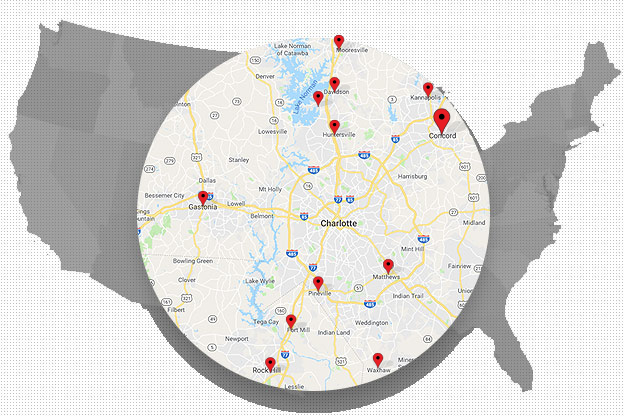10 Reasons Why There May Be Hidden Dangers in Your Basement

Could you have dangerous black mold in your home?
Basements are known for their damp walls and darkly lit corners, but not so much the dangers and risks of damaged foundation. They’ve remained a staple of horror films thanks to their typically creepy appearance. However, that’s not how the average basement should look.
A musty, moldy basement isn’t something to shrug off or repair next year. You’ll need to start now to find and eliminate common issues plaguing your basement. But this can be tricky if you’re not familiar with these problems.
Without further ado, here are 10 reasons why there may be hidden dangers in your basement.
1. Mold
Mold thrives in moist places, including damp basements. And while the toxic black mold is a well-known threat to homeowners and their properties, white mold can be just as dangerous.
Though you may think of mold as something that ruins your weeks-old leftovers, it can eat through far more than bread, yogurt, or meat. Molds can destroy concrete, plastic, metal, wood, and almost anything else your basement is made of.
When mold colonies release spores, wind (or your home’s HVAC system) pull in those spores and spread them throughout your home. These spores may begin to grow in sinks, bathtubs, showers, and other humid areas.
They can also cause significant health problems, notably those involving the respiratory tract. Consequently, it’s crucial to do everything in your power to prevent and remediate basement mold colonies.
2. Humidity
Damp basements may be a haven for mold, but what causes them to become damp in the first place? Well, basements have a bad habit of attracting water.
Heavy rainfall, clogged gutters, cracks in the basement walls and foundations, and nearby sewage overflows can cause water to end up in your basement. Though this water may drain away or evaporate on its own, your basement will likely be humid.
Getting rid of this excess humidity may require you to purchase or rent industrial fans and dehumidifiers. Or, you could waterproof your basement now and save time and money trying to get rid of mold and moisture!
3. Cracks
When concrete becomes wet and goes through temperature changes, it can begin to form cracks and decay. That’s because water naturally erodes materials over time. Temperature changes can cause concrete to expand or contract, leaving cracks.
This isn’t an issue for many cold, wet stones near formations like waterfalls or rivers, but that’s because they’re not supporting a house. When it comes to your basement, you don’t want to see cracks in the walls or floors.
Leaving cracks to fester and expand could jeopardize your home’s safety. It’s best to get any crack evaluated by a service technician as soon as possible. You’ll also want to invest in regular pest control treatments for your basement.
4. Pests
Termites, rats, cockroaches, and all other sorts of pests can infiltrate your basement and claim it for themselves. If you’re not careful, you could wander into your basement in search of stored items only to find it overrun with pesky pests.
Not only is this irritating and a potential source of property damage, but it could also prove risky for your health. Some household pests are known to carry and transmit disease, so staying pest-free is essential to your household’s good health.
5. Uneven Foundation
A combination of water, pests, and erosion can make for a dangerously uneven foundation. When a home’s foundation begins to show signs of cracks or dips, it’s time to call in a team of professionals. Otherwise, your home may crumble.
Your house could have strong walls and a sturdy roof, but if the foundation is uneven or is slowly decaying away due to water damage, it’s not safe. Be sure to check your basement’s flooring and walls for signs of unevenness, cracking, or buckling.
6. Buckled Walls
When a home’s foundation begins to decay and sink, the basement walls may begin to buckle beneath the upper floors’ weight. This is a dangerous situation and one that requires immediate care. Otherwise, collapse is imminent!
7. Flooding Dangers
We’ve already mentioned mold and humidity, but basements can (and do!) fill up will water. In some cases, the floodwater may be coming from a nearby sewer. This nasty liquid may bring dangerous bacteria into your home.
Because basements almost always lie below ground level, they’re particularly prone to flooding. Heavy rain, cracked walls or flooring, or a faulty sump pump can contribute to basement floods.
Waterproofing your basement may help you avoid many related dangers of flooding, including bacteria, mold, mildew, and decay. Consequently, it’s one of the smartest safety and maintenance decisions you can make regarding your basement.
8. Gas
The basement is not only prone to flooding, but gas accumulating as well. Many household appliances that function with gas fuels are placed and operated in the basement.
To make matters even more perilous, many basements lie atop small deposits of radon. This gas can enter the home via the basement and build up to fatal levels before owners become aware.
Gas detectors in the basement can help prevent accidental deaths or injuries resulting from natural or appliance-based gas build-up. Still, owners will need to remember to check these detectors often to ensure that they’re working.
9. Fire Danger
If your home has a basement, there’s a good chance that there’s a heater in that basement. Heaters are beneficial, but they can also pose certain dangers. When left to operate unmaintained, a home’s heater could explode or catch fire.
Should you only visit your basement every once and a while, you may be unaware of dust or dirt build-up around your heater. When you operate it during the early winter months, you may be putting your home at risk of catching fire.
10. Home Security
Some basements have small windows or entry areas. This can help them “breathe” or allow tenants to enter the basement from a driveway or sideyard area. But it can also become another entry point for home invaders and burglars.
If you don’t have your basement windows outfitted with strong, shatter-resistant glass or tight locks, you’ll want to change that. It may also be helpful to attach your basement’s entry points to your existing home security system.
10 Reasons Why You Need a Basement Waterproofing Company
We’ve explored 10 reasons why you may have hidden basement dangers, including mold, humidity, pests and flooding. Although we touched on a few potential remedies for these issues, you may need additional services to protect your home and repair your basement.
A waterproofing service could be the best option after repairing a dangerous basement. Though you’ll also need to invest in carbon monoxide detectors and other safety instruments, waterproofing could prevent many of the above dangers as well.
Do you need a team of professionals to gauge your basement’s safety? Contact us today for a free estimate. We’re happy to help.
Learn more about Sedona Waterproofing Solutions.
Recent Posts
- How Crawl Space Encapsulation Benefits the Environment – An Expert Guide
- 6 Ways Professionals Keep Your Crawl Space in Top Shape
- Structural Repair Solutions for Crawl Spaces, Basements, and Foundations
- Essential Crawl Space Repair Tips Every Homeowner Should Know
- The Importance of Radon Mitigation: Ensuring a Safe Living Environment for Homeowners
Categories
- Basement Mold
- Basement Waterproof Foundation
- Basement Waterproofing
- Crawl Space Dehumidifier
- Crawl Space Encapsulation Cost
- Crawl Space Repair
- Crawl Space Waterproofing
- Encapsulation
- Foundation Repair
- Foundation Waterproofing
- French Drains
- Leaky Basement
- Mold Remediation
- Mold Removal
- Radon
- Slab Jacking
- Sump Pump
- Uncategorized
- Vapor Barrier
- Water Leak
- Waterproofing
- White Mold
Archives
- June 2024
- May 2024
- March 2024
- January 2024
- June 2023
- May 2023
- April 2023
- March 2023
- February 2023
- January 2023
- December 2022
- November 2022
- October 2022
- September 2022
- August 2022
- July 2022
- June 2022
- May 2022
- March 2022
- February 2022
- January 2022
- December 2021
- November 2021
- October 2021
- September 2021
- August 2021
- July 2021
- June 2021
- May 2021
- April 2021
- March 2021
- February 2021
- January 2021
- December 2020
- November 2020
- October 2020
- September 2020
- August 2020
- July 2020
- June 2020
- May 2020
- April 2020
- March 2020
- February 2020
- January 2020
- December 2019
- November 2019
- October 2019
- September 2019
- August 2019
- July 2019
- June 2019
- May 2019

